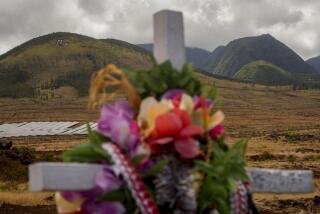Culture Shock Diminishes Pacific Islanders’ Dreams of New Life in Utah : Immigration: The pace of life in U.S. is in sharp contrast to easygoing way of life they left behind. They encounter poor jobs, fractured families.
- Share via
SALT LAKE CITY — Thousands of Pacific Islanders, trading their tropical paradise for a chance at the American dream in Utah, have found only disillusionment in the land of opportunity.
They have found poor jobs, fractured families, youth gangs and an education system unequipped to bridge cultural and language barriers.
“We didn’t foresee what was lying ahead of us. We just came quickly, rushing to come to the United States,” says Sione Fakahua, pastor of the First Tongan Methodist Church.
“We now understand that it’s not easy at all and that little of this culture compares with the easygoing way of life in the islands,” he said.
State and religious leaders have taken few steps to ease the cultural passage for about 15,000 to 20,000 Tongans and close to 3,000 Samoans, a population that doubled during the 1980s.
In the islands, life revolves around tightly knit communities. Houses are built of palm fronds and food is readily available from the trees and the sea. The island of Tonga is the only kingdom left in the South Pacific and Samoa that still continues its tradition of warrior chiefs.
Transplanted to Utah, such cultures don’t mesh readily with a predominantly white society, notwithstanding the fact that many share the Mormon faith.
“There is just a lack of cultural sensitivity in Utah,” said Randy Wong, a Chinese-Hawaiian working in the state Department of Employment Security. “I think that cultures get lost and there isn’t any group that understands another group. And then we just have a tendency to ignore each other.”
Island immigrants flock to Utah in search of economic stability. The Church of Jesus Christ of Latter-Day Saints, which has enjoyed rapid growth in the South Pacific since World War II, also is an attraction.
But in Utah, many Pacific Islanders live at or below the poverty level. An estimated 75% of the local Tongan community works in unskilled, manual labor. Younger Polynesians often do poorly in school and some turn to gangs for encouragement and security.
Wong said role models are few because there aren’t many members of minorities in Utah holding high positions in government or business. Without them, ethnic awareness is slow to make a difference.
“It starts at the very top,” Wong said. “The governor has signed proclamations for minority days. But that’s where it stops.
“We don’t have him personally involved in the activities. It’s like, ‘Here is a token to acknowledge this ethnic day and now you take it from here.’ ”
Others say the Mormon Church could do more to help them assimilate.
“There is some disillusionment in the way the faith is practiced in this state,” said Edwin Napia, a Maori-American graduate student at the University of Utah.
“They teach universal brotherhood, but here sometimes I feel you are looked down upon because you’re not white. Maybe they don’t recognize that conflict,” he said.
Rodney Fakatou, a second counselor in the church’s Liberty Stake in Salt Lake City, estimates that 60% to 70% of all Pacific Islanders in Utah are Mormon. The church opened three Tongan wards and one Samoan ward in Salt Lake during the 1980s.
Former Mormon bishop Phil Uipi, a Tongan-American elected to the Utah House last fall, said religious leaders wield enormous influence over Pacific Islanders and should play a more active role.
“We need to look at the lives of our youth now instead of the life hereafter. We need to be innovative. We just can’t continue to sit up at the church office building,” Uipi said.
Uipi has become a symbol of success for the community. Pacific Islanders also have held high positions in student government at the University of Utah. Samoans and Tongans excel in college athletics throughout the state.
But community leaders say the gains are minimal given the problems confronting Polynesian minorities.
Gangs such as the Tongan Crip Gangsters and Sons of Samoa have flourished, and though community leaders say very few youths are members, the gangs have hurt the islanders’ image among whites.
Salt Lake City Police Lt. Steve Chapman said the two gangs are involved “in all types of criminal activity from homicide down to petty theft.”
In Utah’s public schools, cultural and language differences are major obstacles. A recent study in the Granite School District found that a majority of Tongan students fell below the 50th percentile in reading skills. And dropout statistics among some Pacific Island groups are disheartening.
Although a large number of students start out at the elementary level, their ranks dwindle to a handful by high school. In Tonga, more than 90% of all students graduate from high school, but the dropout rate in Utah tops 25%.
Members of the community admit that they are partly to blame for those statistics.
There is less emphasis in the islands on reading and parental involvement in education, they say. Although many move to the United States to better their children’s educations, the quest for prosperity often takes precedence.
“They start getting money and they lose sight of their goals for the education of their children. There is this fast income and they push them to start working even before high school,” said Sela Mapa, a Tongan-American teacher at Mountain View Elementary on Salt Lake’s west side.
But the problems go deeper than the schools. First-generation immigrants say they are losing touch with their offspring.
“The husband and wife work, kids spend six or seven hours in school with their American friends. There’s no communication and it’s leading to the collapse of our families,” said Samoan-American Mike J. Brunt, an outreach counselor at the Asian Assn. of Utah.
Brunt said problem-solving on the islands is a community effort. And the physical discipline parents there use to keep youngsters in check has led here to charges of abuse and, in some cases, jail.
“The parents say their hands are tied. They are at a loss for what to do about children who talk back or who get in trouble or who belong to gangs,” Brunt said.
As the community looks inside, some help is beginning to come from outside.
Gov. Norman H. Bangerter set up a Polynesian Advisory Council after being approached by community leaders. The council has since created a Polynesian Day and sponsored a health fair.
At Mountain View Elementary, a program funded with federal dollars and specifically targeting English-speaking Tongans and American Indians is starting to bring results.
The programs have helped academically and, what’s more, have made parents feel welcome. That has led to increased involvement in their children’s education, said Principal Nancy Larsen.
More to Read
Sign up for Essential California
The most important California stories and recommendations in your inbox every morning.
You may occasionally receive promotional content from the Los Angeles Times.













